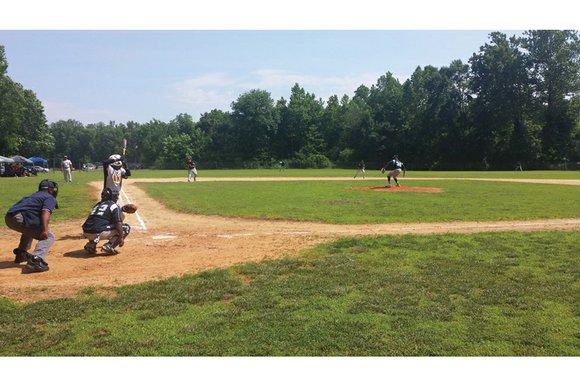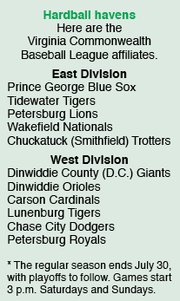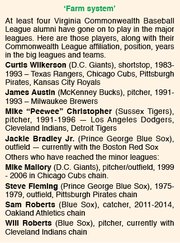Old-fashioned baseball reigns in the country
Fred Jeter | 6/17/2016, 3:15 p.m.

Baseball is losing ground in urban areas but remains a premier attraction down dusty country roads, far removed from the city’s hustle and bustle.
On diamonds carved out of the woods in places like Prince George and Dinwiddie counties, old-fashioned country hardball, spiced with ample music, food and socializing, still takes center stage on warm weekends.
The predominantly black Virginia Commonwealth Baseball League, founded in 1972, is actually in a growth spurt, having expanded from six to 11 teams since 2013.
“As more people in different areas find out about us — about adult baseball — we keep adding teams,” said acting president Charles Ellis.
“It’s good baseball — lots of former high school and college players. But the most fun part is the spectators coming out and enjoying themselves.”
The league’s name has changed through the years, from Central League to Tri-Cities League to Virginia Central League prior to its current tag.
A three-man board of directors handles decision making.
Ellis, a 1961 graduate of the former George Washington Carver High School in Chesterfield, often serves as public address announcer and statistician at games.
Having witnessed the league’s ebbs and flows over the decades, Ellis was in top form behind the mic for the June 12 showdown between the league’s two premier teams — the Dinwiddie County (D.C.) Giants and home-standing Prince George Blue Sox.
The Blue Sox diamond, located at 9800 Centennial Road in Disputanta, is surrounded by woods and features a grass infield, outfield fence and covered grandstand.
The laid-back, after-church atmosphere on a muggy Sunday resembles images of old Negro League matchups prior to 1947.
Between innings, an up-tempo DJ revs up the audience with high-volume, high-energy sounds, mixing oldies with contemporary songs.
The concession stand business is brisk, with fried chicken, barbeque and french fries among the popular choices. Even those not planning on eating succumb to captivating aromas.
And while adult beverages are permitted and for sale onsite, it’s a family friendly outing with as many women and children attending the games as men.
Fans flocked to see the much-awaited Blue Sox take on the Giants, but seemingly no one was in a hurry to see the 3 p.m. opening pitch. The growing flock filled the covered stands and brimmed over to the shaded surrounding areas.
Canopies begin popping up down baselines.
Tickets — or “donations” as they like to say — are “about $3,” but subject to negotiation.
The grassy parking lot can’t keep up with demand for spots.
Attendance peaks at maybe 500 by the fifth inning, when an unexpected thunderstorm strikes with a vengeance, interrupting play and scattering unprepared onlookers.
Once skies brighten and the play resumes, player-Coach Chia Taylor’s Giants win 2-0, behind hurler Brian Bierlein, improving to 6-0 and establishing themselves again as the in-season champ.
The Blue Sox, under venerable Coach Bill Crockett, fall to 5-2 with both losses to the Giants.
History reveals that if the Giants don’t win the pennant, the Blue Sox will.
“It’s a rivalry that’s been going on a long time — 20 to 30 years,” said Coach Taylor.
Somehow, adult baseball flourishes in the backwoods while it struggles elsewhere. City schools nowadays sometimes have difficulty fielding a baseball squad. Major League Baseball is less than 10 percent African-American.
On an adult participation level, slow-pitch softball long ago took roots and isn’t about to budge.
“I’d say softball is our biggest opponent in attracting players,” said Ellis. “And all those year-round basketball leagues hurt, too.”
On just about any weeknight or weekend, it’s not difficult to find a softball game or 10 — men’s, women’s and co-ed — at any public park.
But if it’s baseball that lights your fire — a crack of the bat meeting horsehide, fastball popping into catcher’s mitt — your choices are limited.
The Giants’ Coach Taylor may have said it best:
“Only one place you can find grown men playing baseball anymore. It’s in the country — right here.”








